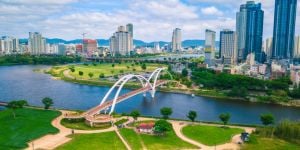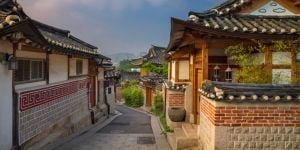With a population of over 50 million, South Korea is one of the most prosperous countries in Asia today. It is an attractive destination for thousands of expatriates around the world. Its economic power opens doors to numerous opportunities in a variety of industries attracting tourists and investors from all corners of the world.
South Korea covers over 100,210 km² on its half of the Korean Peninsula and is also known as the Land of the Tiger, due to the distinct shape on the map. The capital of Seoul counts about ten million people and is in 4th place of the 10 wealthiest cities in the world by GDP today.
Demography
South Korea is home to around 50 million people, compared to about 25 million in the north. It is known to be an ethnically homogeneous country with a Chinese minority. Although many Koreans have emigrated to other parts of the world, millions of foreigners, particularly from Europe and the United States, have settled in South Korea over the past decades. The cities of Seoul, Busan and Incheon are the most densely populated with 10 million, 3.5 million and 3 million people respectively.
South Korea's official language is Korean, but languages such as Chinese and English are also spoken by a large part of the population. On top of that, foreign languages such as French, German, and Spanish are widely popular and taught at schools around the country.
Economy
Since the Korean War, South Korea has become one of the world's greatest economic powers. Its Gross Domestic Product (GDP) amounted to over 1.411 trillion USD in 2016 while the growth rate for the same year was around 2.7%, representing a slight increase compared to 2015 (1.383 trillion USD). Its economy is mainly based on export and import. Several other sectors such as industry, food, information, and communication technology, also contribute to its GDP.
The country is a member of the Asia-Pacific Economic Cooperation (APEC), the Southeast Asian Nations Association and the G20.
Politics
South Korea is a republic governed by a President, who is also the Chief of armies. Moon Jae-In was elected after the impeachment of his predecessor, Park Geun-hye in the 2017 South Korean presidential election. He will occupy this chair for five years. Lee Nak-yeon was nominated Prime Minister.
The South Korean parliament, which is known as the National Assembly or the 'Kukhoe', consists of 300 seats. 245 MPs are directly elected while the remaining seats are distributed proportionally.
Climate
South Korea is influenced by a mixture of a humid continental climate and a humid subtropical climate. The country has four changing seasons: winter, spring, summer, and autumn. Winter lasts from November to February and is marked by moderate to heavy snowfall. Spring begins in March and is relatively short. Summer comes in May with temperatures that can reach up to 25°C. The monsoon season usually starts in late June and lasts until the end of July. In September, autumn arrives with a rather light, windy and dry climate.
We do our best to provide accurate and up to date information. However, if you have noticed any inaccuracies in this article, please let us know in the comments section below.







